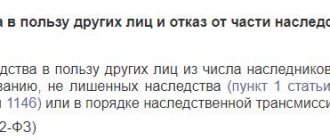What is the deadline for accepting an inheritance?
Inheritance, like many other procedural procedures, is limited in time.
The establishment of such a restriction is necessary, firstly, to discipline and stimulate participants in civil proceedings. No matter how deep the grief of loss, relatives must promptly carry out the actions provided for by law, otherwise they may be left without an apartment, house, car and other inherited property. Secondly, exact time intervals are established for the timely disposal of property - searching for applicants, establishing the location and value of property, satisfying the legal rights of heirs and creditors.
Thus, the law (Article 1154 of the Civil Code of the Russian Federation) establishes the terms of inheritance:
- are common;
- special (special).
It is logical that they differ in duration, in the circumstances of application, in the basis for the beginning and end of the countdown.
Let us consider in more detail in which cases general and special (special) deadlines are applied.
General period for accepting an inheritance
According to the general rule, provided for in paragraph 1 of Article 1154 of the Civil Code of the Russian Federation, an inheritance can be accepted within 6 months from the date of its opening, that is, from the date of death of the citizen whose full name is indicated on the death certificate.
The legislation (Chapter 11 of the Civil Code of the Russian Federation) defines the general procedure for calculating the beginning, course and end of procedural deadlines.
Thus, according to Article 191 of the Civil Code of the Russian Federation, the starting point is
the next day after the occurrence of the determining circumstance.
Thus, the inheritance period begins the day after death (or the day after the occurrence of other circumstances provided for by law - we will consider them below). According to Article 192 of the Civil Code of the Russian Federation, the period for accepting an inheritance, calculated in 6 months, expires on the corresponding date of the 6th month.
For example, if the testator died on August 12, 2020, the 6 month countdown for inheritance begins the next day, August 13, 2018, and expires on February 13, 2020.
If the end of the period occurred in a month in which there is no corresponding date, according to Part 3 of Clause 3 of Article 192 of the Civil Code of the Russian Federation, it is considered to have expired on the last day of the month.
For example, if the testator died on March 30, 2020, the countdown of 6 months of inheritance begins the next day, March 31, 2018, and ends on September 30, 2020, since there is no “31” in September.
According to Article 193 of the Civil Code of the Russian Federation, if the last day of a 6-month period falls on a non-working day (holiday or day off), the expiration day will be considered the next working day after it.
According to Article 194 of the Civil Code of the Russian Federation, an inheritance is considered accepted in a timely manner, even if on the very last day...
- the heir has filed a statement of intention to accept the inheritance - before the end of the notary's working day;
- a letter stating the intention to accept the inheritance is sent to the postal service within 24 hours, even if it is received by a notary after 6 months.
Special deadlines for accepting an inheritance
Special (special) deadlines are established for those cases when the right of inheritance arises not from the moment of opening of the inheritance, but from the moment of the occurrence of other circumstances.
Let's look at each of these determining circumstances.
- The date of entry into force of a court decision by which a citizen is declared dead is the beginning of the 6-month period for inheritance.
Note! In this case, the moment of opening the inheritance is not the date of the expected death of the citizen indicated in the court decision, in accordance with paragraph 3 of Article 45 of the Civil Code of the Russian Federation, but the date of entry into force of this court decision. Thus, the law protects the rights of heirs who do not have the right to accept the inheritance until the court decision comes into force, while if the period began to run from the date of the alleged death, the 6-month period would most likely be missed.
- The date of refusal or exclusion of heirs from inheritance is the beginning of the 6-month period for inheritance by other heirs:
- the date the notary received the application for refusal of inheritance, in accordance with Article 1159 of the Civil Code of the Russian Federation;
- the date of entry into legal force of the court decision on exclusion from inheritance, in accordance with Article 1117 of the Civil Code of the Russian Federation.
- The date of birth of the heir conceived during the life of the testator , according to Article 1116 of the Civil Code of the Russian Federation and paragraph 2 of Article 17 of the Civil Code of the Russian Federation, is the beginning of the countdown of 6 months for inheritance by him.
- The end date of the 6-month period during which the inheritance was not accepted is the beginning of the countdown of the shortened 3-month period for inheritance by other heirs, in accordance with paragraph 3 of Article 1154 of the Civil Code of the Russian Federation.
The inheritance is considered not accepted if, within the 6 months provided for this, a corresponding application has not been submitted, no actions have been taken indicating the intention to accept the inheritance, and a refusal has not been declared.
- The date of death of an heir who did not have time to accept the inheritance is the basis for inheritance by other heirs in the order of transmission in accordance with 1156 of the Civil Code of the Russian Federation. If there are less than 3 months left before the end of the main period, it is extended to 3 months, in accordance with paragraph 2 of Article 1156 of the Civil Code of the Russian Federation.
- The date of death of an heir who did not have time to accept the inheritance is the basis for the start of 3 months for inheritance by the designated heirs under the will, according to Article 1121 of the Civil Code of the Russian Federation.
Time to open inheritance
The time for opening an inheritance is regulated by Art. 1114 of the Civil Code of the Russian Federation. According to it, the opening of an inheritance, which includes movable and immovable property, is made on the day of death of the testator. In addition, the day of its opening can be considered the date when the death of a citizen supposedly occurred (Clause 3 of Article 45 of the Civil Code of the Russian Federation). The exact opening date may be approved by the court.
Based on clause 2 of Art. 1114 of the Civil Code of the Russian Federation, if the death of the testator and the heir occurred on the same day, the rights to the property are transferred to the heirs of each of the deceased. It should be noted that since the deceased heir was unable to assume rights to inherit the property of the deceased, they are not transferred to his own heirs by law or will.
Terms of inheritance
The date of opening the inheritance case, the time of entry into the inheritance and the period for issuing the certificate are established by the Civil Code of the Russian Federation (Part 3 of Federal Law No. 146). It also (Article 1155) indicates ways to restore deadlines after their expiration.
By will
The time frame for entering into an inheritance under a will is 6 months . You can receive property (apartment, house, land, car, etc.) and cash contributions under a will only after the death of the testator. In this case, heirs can be not only close and distant relatives, but also third parties. A certificate is issued if the following conditions are met:
- the will was drawn up at a time when the maker was legally competent (there was no guardianship over him) and of sound mind (was not under the influence of psychotropic substances, was not depressed, did not suffer from mental illness, etc.);
- the document was drawn up in the presence of a notary, who certified the paper with his signature and seal, thereby confirming the free will of the testator, his sober mind and signature;
- an application to open an inheritance case has been submitted to the notary's office within 6 months;
- an assessment of movable and immovable property (composition and cost) was carried out;
- a check was carried out for the presence of a later version of the will, additions and changes to the text.
The date of opening of the inheritance case is not the day of filing the application, but the date of death of the testator or the date of recognition of the fact of death by the court, if the testator disappeared and his body could not be found within a certain time.
If a package of documents is submitted on time and there are no other applicants for the inheritance, the certificate can be issued earlier than 6 months. However, when trying to challenge the will in court or the possibility of the birth of a conceived but unborn child from the testator, the deadlines are extended (registration of the certificate is suspended) until the completion of the litigation or the birth of a minor heir (he will be allocated a mandatory share).
In law
The period for accepting an inheritance under the law is the same as under a will. However, there are some nuances.
- The 6-month period for receiving an inheritance begins on the date of death of the owner.
- If the heir or heirs of first priority refuse the inheritance or their death during the period of the open inheritance case, a new countdown of the period begins. In case of refusal - from the date of signing the refusal paper, in case of death - from the date of death.
- The new period will be shorter and will be only 3 months, or more precisely 90 days.
- If it is proven in court that the heir is unworthy, then the new period for issuance will begin from the moment of the final court decision (the possibility of filing an appeal is taken into account) and will be 6 months.
If, within the specified time frame, the actual entry into the inheritance did not take place or the documents on entry into the inheritance were not submitted to the notary’s office, the inherited property passes to the state.
By deed of gift
Transfer of property from one individual to another by gift is the most common way of changing the owner of real estate, including land and vehicles. There are no deadlines here - ownership passes from the donor to the recipient automatically from the moment the item of donation is transferred. However, the deed of gift may stipulate different terms for the transfer of property from one hand (the owner) to another (the donee):
- after reaching adulthood;
- after the death of the donor.
Using this form of transfer of inherited property allows you to bypass the allocation of a compulsory share in the inheritance - the gift is not subject to the rights of the heirs (it will not have to be divided with the heirs who, by law, have the right to a compulsory share when drawing up a will). Most often, this option for disposing of inheritance is observed in two cases:
- when the husband gives his wife, or vice versa, part of the apartment that belongs to him (her). In this case, the children will not be able to receive and, therefore, sell their share and worsen the living conditions of the surviving spouse;
- the parent transfers ownership of his property to the child, protecting him from legal proceedings on the part of the stepmother or stepfather.
Inheritance procedure
Begins on the date of death of the testator and ends at the end of 6 months.
1. Make an application for the notary in (written form)
This document can be drawn up by any notary, since the inheritance file is in a common database and excludes the preparation of documents by several authorized persons. In the application for acceptance of inheritance under a will and issuance of a certificate of inheritance, the full name is indicated. testator, date of his death, residential address, degree of relationship and instructions on leaving an inheritance in favor of the applicant.
Inherited property is also listed. After the transfer, the applicant confirms whether he accepts the inheritance or not and requests the issuance of a certificate of right to inheritance.
The application indicates the presence or absence of “regular” heirs and those who claim the obligatory share.
Collect documents
Above we have listed the documents that must be attached to the application. It is worth saying that the property should not be encumbered, and the fate of the property must be confirmed from the moment of its transfer until the moment it is acquired into ownership.
For example, if an apartment or plot of land was transferred into possession by an authorized body, and then it was re-registered as ownership, then it is necessary to provide the notary with the entire chain of documents (privatization documents, acts of the authorized body on the transfer of real estate).
Pay the state fee
The Tax Code establishes that the establishment of the amount of such a duty depends on the degree of relationship: relatives of the 1st stage pay 3/10 percent of the value of the inherited property, but not more than one hundred thousand rubles; other relatives pay six tenths of a percent, but not more than one million rubles.
You may also be required to pay a fee for the protection of inheritance, which will amount to 600 rubles. All participants in the inheritance process are equally burdened with paying state fees.
Exemption from payment of state duty occurs:
- In relation to persons living together with the testator and claiming to inherit a residential premises, a plot of land with a house, an apartment or part thereof.
- In relation to the property of a deceased relative performing state or public duties to save lives or protecting state property.
- In relation to funds in bank accounts, insurance amounts under insurance contracts, copyrights and other payments.
- If the heir is a minor or incompetent, over whom guardianship has been established.
- In relation to amounts that are compensation payments upon the death of an employee at the enterprise and insured in the event of death.
4. Receive a completed certificate from a notary
Receiving a formalized certificate does not imply the personal presence of the heir. So, having written an application, the notary will send it by mail or give it to the representative for whom the power of attorney (also notarized) has been drawn up.
Deadlines for accepting an inheritance
The period during which the inheritance must be accepted is six months from the date of its opening (Article 1154 of the Civil Code of the Russian Federation). If the opening of the inheritance occurred on the day of the presumed death of the testator, it can be accepted only after the relevant court decision has entered into force.
If the rights to the property of the testator are renounced, they pass to other persons determined by law or by will. In this case, these persons receive six months to accept the inheritance in accordance with paragraph 2 of Art. 1154 of the Civil Code of the Russian Federation. At the same time, they must take possession of movable and immovable property no later than nine months after the death of the testator.
What is needed to enter into an inheritance?
To receive the property of a deceased relative, no later than six months later, you must contact a notary at the place of residence of the deceased or at whom the will is kept. When you come to the notary, you need to write a statement in which you should express your intentions to enter into inheritance rights. You should have a number of documents with you:
- passport;
- death certificate;
- documents confirming relationship with the deceased.
If necessary, the notary will provide a list of additional documents that will need to be attached. As a rule, this is title documentation for inherited property. A document confirming the right of inheritance is issued 180 days after the death of the testator.
Deadlines for issuing a certificate of inheritance
Article 1163 of the Civil Code of the Russian Federation determines the deadlines for issuing a certificate of the right to inheritance.
The heir can receive a certificate confirming his rights to the inheritance at any time after the end of six months from the opening of the inheritance.
It is possible to obtain a certificate before the expiration of the six-month period if the absence of other heirs by will or law is documented. This is necessary so that subsequently there will be no need to redistribute the inherited property based on another heir.
The court has the right to suspend the issuance of a certificate . Also, it cannot be issued if the testator has an heir who was conceived before his death, but has not yet been born.
Who has the right to inheritance under a will?
The law does not limit the circle of persons to whom the testator has the right to transfer his property or delegate property rights and obligations.
This rule only works if 4 conditions are met:
- The court established the incapacity of the testator - the owner of the property. If it is established that at the time of drawing up the will the testator did not or could not understand the essence of his actions or direct them, then this unilateral transaction will be considered void.
- The property specified in the will has no material value. Since a will is a transaction, its essence is the transfer of material assets. For example, a testator bequeaths an apartment in a building recognized as unsafe. This apartment is not subject to assessment and, accordingly, cannot be considered as an object for transferring ownership of it.
- The testator is not the owner of the property. As an example, we can cite the designation in the will of the transfer of an apartment that was transferred under a social tenancy agreement to the testator by local authorities. In order for this apartment to be transferred, the testator is obliged to take normatively significant actions, such as privatization.
- Persons determined by law have the right to a compulsory share in the property.
Deadlines for actual inheritance
Article 1153 of the Civil Code of the Russian Federation provides for different ways of accepting an inheritance. The first is submitting an application to a notary, and the second is the actual acquisition of inheritance rights. Upon actual acquisition, the heir does not apply to the notary, but carries out one of the following actions:
- continues property management;
- uses measures to preserve property;
- protects property from attacks;
- independently covers the costs of maintaining the facilities;
- voluntarily and promptly repays the debts of the deceased testator that relate to the property.
The heir must begin to carry out these actions immediately after the death of the testator, that is, during the first six months. These actions must be documented in order to be able to obtain a notarized certificate for the re-registration of property rights in the future.
When actually accepting an inheritance, you can contact a notary for a certificate at any time, even after 6 months, provided there are no property disputes with other participants in legal relations.
If a person actually accepted the property, but the inheritance was opened on the initiative of another relative, who, after six months, received a notarial certificate for this property, then the conflict must be resolved in court.
From what day does the deadline start?
In accordance with Art. 1154 of the Civil Code of the Russian Federation, 6 months are given for accepting an inheritance. But this is not the time to obtain a certificate and register property, but a period during which you can and should present your rights to the property left after the deceased.
The period begins to count from the moment of death of the testator. If the heirs of the first stage refused their share or died before receiving the certificate, a new countdown begins, but only 90 days.
If the owner disappeared and was not found either alive or dead for a long time, relatives can record the fact of death in court. In this case, the countdown of time for receiving an inheritance begins from the date of the court decision.
How to calculate the period of inheritance?
The deadlines that are counted for entering into inheritance rights are calculated from the next day after the death of the copyright holder . The date and time of death must be recorded and documented and subsequently provided to the court. If the date of death has not been precisely established, then the deadlines are counted from the date established in court, i.e. the next day.
There are a number of reasons why heirs may be excluded from the right to enter into legal inheritance rights or they have voluntarily renounced this right. In this case, the deadline for receipt according to current legislation is 6 months.
If the heir was born after the death of the testator, the period is calculated from the date of birth of the citizen.
What actions need to be completed within the allotted time?
During the specified period, legal successors must perform the following actions:
- Submit an application to a notary office.
- Prepare title documents.
- Collect or restore documents on the presence of family ties.
- Establish paternity posthumously in court.
- Conduct a property assessment.
- Pay the state fee.
- Contact the notary again.
List of documentation for applying to a notary office
| № | What is the document for? | What can you show? |
| 1 | To certify the fact of the death of the testator | Death certificate issued by the registry office, or a corresponding court decision |
| 2 | To verify the identity of the applicant |
|
| 3 | To confirm the last place of residence of a deceased person | Certificate of residence (issued on the basis of the house register and death certificate) |
| 4 | To confirm the close relationship of the applicant with the deceased person |
|
Maximum period for entering into inheritance
The maximum period for entering into an inheritance directly depends on the status of the successor:
- Heirs of the 1st stage apply to the notary office within 6 months.
- If they are absent, then during this period other relatives who have the right to the property (in accordance with the order of inheritance) must apply.
- If the legal successors of the 1st line executed a written refusal of the property or were removed by a court decision, then the recipients of the 2nd line are given another 6 months. The period begins to run from the day following the registration of the refusal, or the day following the day the court decision enters into legal force.
- If recipients of the 1st line simply did not appear before the notary, then the assignees of the 2nd line have the right to apply within 3 months.
- In the event of the death of an heir after the opening of an inheritance case, his successors have the opportunity to submit an application to a notary within the prescribed period. If the citizen died after 3 months, the period is extended for another 3 months.
- If there is a conceived but unborn baby, the time frame for registering an inheritance increases until the child is born. The notary is obliged to suspend the issuance of the certificate if he becomes aware of such a fact.
If during this period the heirs do not contact the notary, then the property rights are transferred to other persons. If it turns out that the deadline for submitting documents has expired, the notary will refuse to issue a certificate.
The ultimate beneficiary is the state. It accepts property that is recognized as escheat. Reinstatement of deadlines is allowed through the court if the applicant missed them for a good reason. By acting independently and without legal support, you can make mistakes, the correction of which will take time. This will lead to missing the deadline and all the associated problems.
A case can be initiated in court within 6 months after the reasons for absence have ceased. If you missed the deadline for accepting an inheritance, contact our lawyers, they will help you restore them in court.
Example. Citizen M. was on a business trip outside the country. At this time his father died. The son hired a funeral agency to organize the funeral, but he himself could not return to the country. He arrived only 1 year later. During this time, the deadlines for entering into inheritance expired. My father left behind a bank account. The assignee turned to the notary and was refused. After which, he filed an application with the court to restore the terms. The court satisfied the plaintiff's demands.
Terms of inheritance after the death of the testator
To ensure that the process of accepting an inheritance does not last indefinitely, legislators have provided deadlines for entering into inheritance rights. Before considering the issue of timing, it is worth understanding from what date they are counted. This moment was called the opening of the inheritance. The law provides two options for opening the inheritance process:
- According to the actual time of death, which must be documented.
- Based on a death certificate from the registry office, obtained based on the results of a medical report.
In some situations, a person is declared dead by a court decision. This is possible if a citizen has been on the list of missing persons for a long time. With this option, the date of opening of the inheritance coincides with the date specified in the court decision.
Article 1154 of the Civil Code of the Russian Federation determines the deadline for declaring one’s inheritance rights or for refusing an inheritance within 6 months after the opening of the inheritance. But the legislation provides for special cases when the period for entering into an inheritance can be extended:
- If the first-priority heir renounces his claims to the property, then the heirs of the second and subsequent priority are given another six months to accept the inheritance from the moment of refusal. In this case, the inheritance case lasts up to a year.
- If the heir of the previous step did not enter into inheritance within 6 months, then other relatives can do this within 3 months after the missed deadline. In such a situation, the time frame for entering into an inheritance can reach 9 months.
Inheritance by law and by will is subject to the same rules in terms of time limits.
The specified six-month time period does not depend on the relationship, as well as on its category (individual or legal entity).
You also need to enter into an inheritance after the death of your parents within 180 days: the heirs of the 1st stage are not endowed with any privileges.
After the specified period, if none of the heirs has shown up, the property is considered escheat and the entire inheritance mass goes to the state.
Consequences of missing deadlines
Receiving the property of the deceased by law implies the transfer of rights to the property until at least one of the legal successors registers the property. The last in line is the state. That is, the property will be received in any case.
First, the relatives of the deceased citizen are called upon to inherit. Acceptance of property occurs within the framework of the queue. Restoration of deadlines occurs through the court. The applicant will have to file a corresponding claim. The main problem is whether the reason for absence is valid
If the maximum period has passed, and the successors of all orders have not contacted the notary, the deadline for entering into inheritance has been missed. This leads to the fact that the property left behind by the testator acquires the status of escheat, that is, one that no one owns. It becomes the property of the state. In this case, in order to enter into inheritance rights, the missed period will have to be restored.
If the inheritance is actually accepted, the consequences are different. The relatives of the deceased citizen will not be able to dispose of his property until they complete the paperwork.
They will need to contact a notary or court and submit documents confirming their rights to inheritance. You can re-register ownership of yourself by a court decision or on the basis of a certificate confirming the citizen’s right to inherited property.
Deadlines
The period for entering into inheritance is limited to six months after the day of death of the testator, but in fact it is calculated from the day following the day of death. This was done for convenience so that there are no discrepancies in cases where death occurs during the change of day (12 o’clock at night).
During these six months, relatives or other persons entitled to inheritance are required to collect the necessary package of documents along with an application for inheritance and submit them to the notary who registered the will. A will is usually drawn up in a notary's office at the place of residence of the testator.
Article 1154 of the Civil Code of the Russian Federation allows you to accept an inheritance in fact or by law (legally). Legal acceptance of property occurs through a notary and ends with the issuance of a certificate of acceptance of rights to the inherited property.
Actual acceptance is certain actions of the heir in relation to the bequeathed property. For example:
- Settled into an inherited apartment and pays utility bills;
- Closed the debt obligations of the deceased or accepted material assets that were intended for the testator from third parties;
- Manages and takes care of inherited property, protects it from theft or other similar actions.
Warning
The actual acceptance of an inheritance is not enough to legally own it. In order to legally legitimize the received property, you need to file an application in court and then prove one of the facts of acceptance of the inheritance.
You should not delay the inheritance deadline and wait for court proceedings. To avoid legal costs and a lot of wasted time, you should contact a notary with an application to open an inheritance case, even if you actually already own it.
The period for entering into inheritance begins with the death of the testator. In cases where the deadline for accepting an inheritance falls on a weekend or holiday, you can apply to the notary’s office before the end of the first working day after the weekend.
More precisely, you can submit an application until the last minute of the 24th hour (12 o’clock at night). You can submit the application through proxies (in which case you will need a notarized power of attorney) or through Russian Post (your signature on the application must be certified by a notary).
What to do if the deadline is missed?
Please note that the period for inheritance can only be extended upon receipt of property through hereditary transmission! In other cases, the missed deadline (only if there are good reasons) can be restored.
So, if it turned out quite by chance that you became an heir, but then it turned out that the deadline established by law for accepting it has expired, then there is no need to panic. The law is on the side of the “late” heirs and provides them with the opportunity to restore rights to the property of a deceased relative. This is provided for in Art. 1155 of the Civil Code of the Russian Federation.
There are 2 ways to enter into an inheritance after the expiration of the allotted period:
- By agreement . Applicable in situations where there are other legal successors who have assumed their rights of inheritance. In this case, the following condition must be met: all specified persons must express their consent that another heir will participate in accepting the property of the deceased relative.
- Through the court . If the beneficiary simply did not know that he should contact a notary, then his claim will definitely be denied. But if he was in the hospital or abroad for several months and did not know about the death of the testator, then the court will restore the period. However, the plaintiff must provide written evidence of the stated facts.
In practice, the method by agreement is used quite rarely, since not everyone agrees to share property with the “latecomer,” so the only option for him remains restoration of his rights through the court. Satisfaction of demands does not always occur. The reason is the absence or insufficiency of evidence that there are compelling reasons for the omission.
In this case, the whole difficulty lies in the fact that the law (Article 205 of the Civil Code of the Russian Federation) does not provide an exhaustive list of such grounds. Cases in courts are considered individually and on the basis of judicial practice in inheritance cases, which is regulated by Resolution of the Plenum of the Supreme Court No. 9 of May 29, 2012.
Therefore, it is advisable to submit the following documents:
- about completing a course of treatment;
- about being on a long business trip;
- evidence of actual acceptance of the inheritance.
Often, the court considers force majeure circumstances (natural and natural disasters, war, etc.) to be valid reasons. Our lawyers will help you draw up a statement of claim to restore the deadlines.
At the same time, it is important to comply with one more condition: the “late” heir must file a claim in court no later than 6 months after the reasons for which he was unable to timely exercise his right to inheritance have disappeared.
Example. The plaintiff is a woman who was in prison for several years. During this time, her parents died. The apartment acted as the hereditary estate. The plaintiff’s brother inherited his ½ share in it, and the sister managed to restore her rights to the second half only through the court 10 years .
Restoring the deadline
The law provides two ways to restore missed deadlines for entering into inheritance. Missing the deadline for entering into inheritance and the procedure for its restoration are described in Art. 1155 Civil Code. The norm also provides for the right of those who missed out to receive the entire amount due to them.
Court
If there are only one heir or there are many of them, but they all missed the moment, or if they refused to re-register their rights under the agreement, then entering into the inheritance due to a missed deadline should be done through the court. According to the rules of the Civil Procedure Code, specified for a specific type of case in paragraph 40 of the Resolution of the Plenum of the Supreme Court No. 9 of May 29, 2012, these disputes will have the form of a claim proceeding.
To restore the deadline, you will need to go to court or a notary
All relatives who received property, both by law and by will, should be called to account. If the property became escheated, that is, transferred to the balance of the authorities, then theirs. In order to determine which organization performs the functions of its ownership, you must request information from the unified state register of real estate.
The state duty when restoring the period for accepting an inheritance is 300 rubles, if property claims are not declared. The claim is drawn up according to the rules of Art. 131 Code of Civil Procedure. That is, the data and contacts of the court, plaintiff, defendants, and third parties are indicated.
For example, if real estate was properly registered, then Rosreestr should be indicated as a third party. If legal representatives act on behalf of a minor or incapacitated person who has missed the deadline, then the guardianship authorities are indicated as a third party.
Sample statement of claim for restoration of a missed deadline
The text itself should describe in detail all the details that are directly related to the case. If the redistribution of rights occurred on a legal basis, the degree of relationship with the deceased should be indicated.
If inheritance occurs on the basis of the will of the deceased, then describe his decision from the will. And then you will need to indicate the reasons why the deadline was missed. The outcome of the case will depend on whether the court recognizes these reasons as valid or not.
Reasons for missing
The law includes the following as valid reasons for restoring a missed inheritance period:
- lack of information about the death of the testator;
- not knowing that he had to be called upon to receive his share;
- being in a helpless state;
- suffering from a serious illness;
- illiteracy.
The list of reasons associated with a specific person in the law is not exhaustive, that is, there may be other factors that prevent you from exercising your constitutional right.
For example, Resolution of the Plenum of the Supreme Court No. 43 of September 29, 2015 offers the following options: at the end of the period for accepting property, the heir was a minor, that is, he did not have full legal capacity.
After turning 18 years old, or gaining legal capacity due to emancipation, he filed a lawsuit to restore the term. Or the heir suffered from a mental illness as a result of which he was limited in legal capacity, and then recovered and was able to independently defend his rights.
Valid reasons for absence are given in Art. 205 Civil Code
At the same time, by virtue of Art. 205 of the Civil Code will take into account the fact that valid reasons for missing the acceptance of the inheritance lasted the entire period established for the re-registration of things.
The following reasons are not considered valid:
- mild health disorder;
- ignorance of the law;
- lack of information about the scope of transferred rights.
That is, those that certainly prevented the implementation of actions in the appropriate period of time, but are not subject to recognition by the judge as significant due to their lack of seriousness.
From the moment the circumstances that prevented you from accepting things no longer apply, you should hurry up and appeal to the judge. And here there is a deadline. It is equal to 6 months. If these six months are missed to restore the violated right, then it will no longer be possible to obtain the relative’s property. Since this period cannot be restored.
Many heirs become hostages of the future; people believe that property must be accepted after six months. It is this misconception that often leads to a violation of the time interval. That is, the deadline for entering into inheritance has been missed without good reason.
From the above, we conclude that lack of knowledge of the law is not a reason to restore the deadline for accepting an inheritance. Therefore, when submitting claims to a judicial authority, it is better to have a more compelling reason.
Process
However, a request to restore time does not constitute recognition of the right to receive a share of what is due. If the plaintiff who made these demands has not confirmed the facts indicating that he has the right to receive things left after the funeral of a relative, then the court will naturally make a negative decision for such applicant.
We support the application with documents confirming the right to receive the property and explaining the reason for the omission. We bring the document to the court reception in person or send a representative with a power of attorney. Within 2 months, the case will be considered and a decision will be made.
The case of restoration of the term is considered in the procedure of claim proceedings
The duties of the judge include not only considering the application, but also ensuring measures to preserve the disputed property in the possession of the defendant. To do this, at the request of the applicant, he may issue a ruling prohibiting registration actions with real estate. That is, on the basis of this document, the property cannot be sold, mortgaged, or re-registered.
If the judge considers the plaintiff’s arguments convincing, he will issue a positive verdict, according to which the relatives’ shares will be redistributed. Such a verdict will itself be a reason to contact the registration authority, that is, there is no need to go to the notary’s office again.
If it was not possible to preserve things in the original volume, then the judge may provide compensation in monetary terms. The defendant must provide funds. And if this obligation is not fulfilled voluntarily, the injured party may, on the basis of a writ of execution, contact the bailiff service and demand the initiation of enforcement proceedings.
But if the judge did not consider the arguments compelling, and you are still confident that you are right. Then you need not to despair, but to write an appeal to a higher-level judicial body.
When is the deadline extended?
If a citizen has not accepted the inheritance within 6 months, he will be able to receive it if this period is restored. There are the following reasons for this:
- the heir did not know about the death of the testator (he had not communicated with him for a long time, lived far away, relatives hid the fact of death, etc.);
- the heir did not know for a long time about the will left in his favor;
- the citizen knew about everything, but had valid reasons for missing the deadline, which prevented the timely entry into inheritance (he was seriously ill, looked after a helpless relative, etc.);
- the remaining heirs do not object to the return of the right to inheritance to the late applicant.
An extension of the period for accepting an inheritance is also possible in the case where the sole heir (or one of the legal applicants) has not taken any action within six months to exercise his right. Then, for other persons who are ready to inherit the remaining property (and are able to do so by law), the period is extended for another 3 months.
Deadline for inheritance according to law
The heir must accept the inheritance within 6 months from the date of its opening: from the date of death or the entry into force of a court decision declaring him dead. A missed deadline can be restored by a court decision by filing an application to establish the fact of acceptance of the inheritance, a statement of claim to other heirs, where documenting the validity of the reasons for not entering into the inheritance. And it can be restored by agreement with other heirs, upon receipt of written consent from each for the entry of a new heir.
Please note that the period for entering into inheritance can be restored until 6 months have passed after valid reasons cease to apply. For example, one of the heirs was on a business trip abroad and did not know about the death of the testator; he was notified at his place of residence in the Russian Federation and he did not receive a letter. Upon returning to Russia, if 6 months have passed after arriving at his place of residence, and he does not go to court to restore the period, it is considered that he is deprived of the right to inherit.
After 6 months from the date of opening of the inheritance, upon payment of the state fee, the heirs receive a certificate of right to inheritance. In the future, they can contact government authorities to carry out state registration of the transfer of rights (for example, to real estate).
Restoring the deadline for accepting an inheritance
In some cases, an inheritance can be accepted after the end of a six-month period from the date of death of the testator (Article 1155 of the Civil Code of the Russian Federation). This is possible in two cases.
- If the heir, who did not manage to enter into inheritance within six months, filed a corresponding application with the court . After considering it, the court may decide to restore the deadline for accepting the inheritance. This is possible provided that the heir had valid reasons why he could not assume his rights. It is necessary that the application to the court occurs no later than six months after the reasons that led to the impossibility of accepting the testator’s property have disappeared.
- Without going to court , an heir who has missed the six-month period accepts his share of the inheritance with the written consent of other persons who have already received the inheritance. Consent must be given either in the presence of a representative of a notary authority, or certified in accordance with paragraph 1 of Art. 1153 of the Civil Code of the Russian Federation.
If there is the consent of the other heirs or a court order, the person who did not have time to accept the inheritance within six months receives it in full , along with the same rights and obligations that apply to the other heirs.
Example: The death of the testator occurred as a result of a car accident on November 14, 2012. Together with him at that moment in the car was his brother, citizen V., who was sitting in the back seat at the time of the accident. The injuries received during the collision with another car were incompatible with the life of the driver. Citizen V. survived, but fell into a coma that lasted eight months. After recovering from a coma, citizen V. filed a petition in court regarding the restoration of the deadline for accepting the inheritance. The court drew attention to the documents presented, confirming the physical impossibility of contacting a notary within six months from the date of opening of the inheritance. Since V. submitted his application less than a year after being discharged from the hospital, he received the opportunity to receive a certificate of inheritance.
Recovery procedure
Algorithm of actions of an interested person in the judicial restoration of inheritance terms:
- preparation of a claim detailing the circumstances and indicating valid reasons for missing the time of inheritance;
- preparation of the necessary documents, including passports, death certificate of the testator, a document confirming the relationship of the deceased and the plaintiff, a notarial certificate of refusal to engage as an heir due to missed deadlines;
- filing a claim with the district court, which can be done in person, through a representative or by mail;
- actual consideration of the dispute;
- making a final decision;
- entry into force of the decision;
- implementation, which is carried out by the notary who initially opened the inheritance proceeding.
Read more about the procedure for restoring a missed deadline for accepting an inheritance.
Limitation periods
The general statute of limitations for disputes related to inheritance is 3 years. This time begins:
- from the day when valid reasons ceased to apply;
- from the day when a person learned about the violation of his property rights.
Special deadlines for accepting an inheritance
In some situations, the general deadline for accepting an inheritance may be postponed.
If the heir does not accept the inheritance, then such a right may arise for another heir or heirs (for example, heirs of a different order). In this case, the time when other heirs need to enter into the inheritance after death (that is, when other heirs can accept the inheritance) cannot exceed three months from the end of the six-month period from the date of death of the testator or from the date of entry into legal force of the court decision on declaring the testator deceased.
If the heir does not accept the inheritance, then such a right may arise for another heir or heirs (for example, heirs of a different order). In this case, other heirs may accept the inheritance within three months from the end of the six-month period from the date of death of the testator or from the date of entry into legal force of the court decision declaring the testator deceased.
If the heir refuses the inheritance or is excluded from inheritance by the court, then another heir may accept the inheritance within six months from the date his right of inheritance arises. The six-month period begins on the next day either after the date of the heir’s refusal of the inheritance, or after the date of the heir’s removal.









